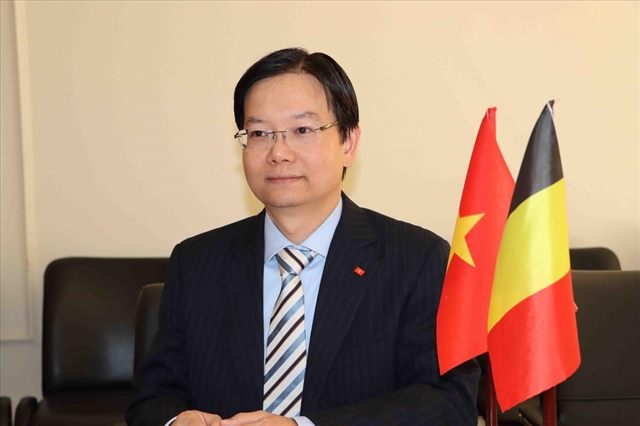 Economy
Economy


|
| A BIDV office in Hà Nội. BIDV will increase its charter capital by VNĐ8.3 trillion to VNĐ48.52 trillion. Photo baodautu.vn |
HÀ NỘI — State-owned and private joint stock banks have been racing to increase charter capital in the last months of this year to boost financial strength and meet the State Bank of Việt Nam (SBV)’s regulations on capital adequacy ratio.
On November 22, 2021, BIDV announced it would close the list of shareholders for collecting written opinions on a plan to increase capital through issuing shares to pay dividends. According to the approved plan, the bank will increase its charter capital by VNĐ8.3 trillion to VNĐ48.52 trillion through distributing dividends in shares and issuing additional shares.
SHB has recently also planned to increase capital from VNĐ19.26 trillion to more than VNĐ26.674 trillion.
Meanwhile, ABBank has announced during the period from November 18 to December 8, 2021, the bank will receive capital from the issuance of more than 114.26 million shares to existing shareholders at the price of VNĐ10,000 per share.
ABBank has also completed the application to the State Securities Commission to carry out the issuance of more than 11.426 million shares to employees under an employee stock ownership plan (ESOP).
Notably, right after completing the offering to existing shareholders and issuing ESOP shares, ABBank will continue to distribute bonus shares at the rate of 35 per cent from the undistributed profit source and the reserve fund worth a total of nearly VNĐ2.44 trillion to raise its charter capital to nearly VNĐ10 trillion.
Some other banks planning to significantly increase charter capital in 2021 are Sacombank with a rise of nearly 32 per cent; VIB, 44.2 per cent; SCB, 32.8 per cent; OCB, 31.8 per cent; ACB, 25 per cent; and HDBank, 25 per cent.
To date, more than 20 banks, such as Vietcombank, VietinBank, BID, SHB, VPBank, TPBank and OCB have increased charter capital to meet the central bank’s regulation. Banks must have their capital adequacy ratio (CAR) to meet Basel II standards as prescribed in Circular 41/2016/TT-NHNN by January 1, 2023. Up to now, 16 out of 35 banks have met the requirement.
Besides meeting the central bank’s regulation, capital increase will also contribute to improving banks’ financial strength and helping them increase medium and long-term capital source to expand business activities. Therefore, the race to increase charter capital among banks is forecast to continue strongly in 2022.
After the first nine months of this year, VietinBank surpassed BIDV to become the bank with the largest charter capital in the country’s banking system. After issuing nearly 1.1 billion shares to pay dividends at the rate of more than 29 per cent, VietinBank’s charter capital increased to VNĐ48.01 trillion. The bank has planned to ask for approval to continuously raise charter capital to VNĐ54.13 trillion at its general meeting of shareholders this year.
It was followed by VPBank with nearly VNĐ45.05 trillion after the bank completed the issuance of shares to increase charter capital by nearly VNĐ19.75 trillion.
However, VP Bank’s position is forecast to change as Vietcombank’s board of directors has recently approved a plan to increase charter capital by VNĐ10.23 trillion to more than VNĐ47.32 trillion. — VNS




